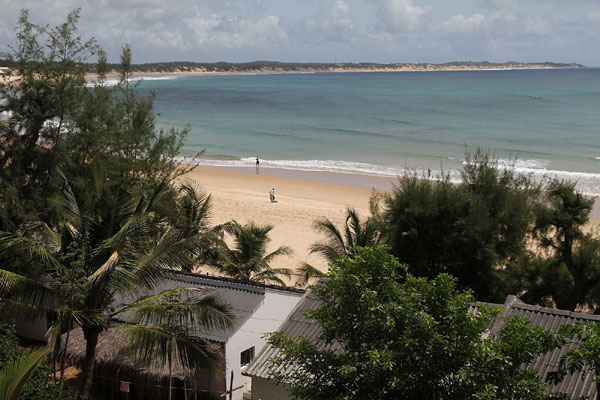Resort life on the cheap
 |
|
The view from Baia Sonambula, a friendly guesthouse with a deck overlooking the beach, in Tofo, Mozambique.[Photo by Seth Kugel/Agencies] |
Rickety ride to Tofo
My four-day plan to drive up the coast, seeking out smaller, emptier beaches, was scuttled when I got a rental car quote of $80 per day. (I had hoped to keep my entire daily budget well below that.) So in Maputo, the capital, I hopped a chapa - a rickety, cramped minibus - for an eight-hour anything-but-nonstop ride to Inhambane, a city near Tofo. It cost 700 meticais, or $21.23 at 33 meticais to the dollar each way.
The bus was hot, and the music was loud (particularly unpleasant given the 5 am departure time), but that was expected. What was not was that across the aisle, an obviously mentally ill man spent the trip grimacing, screaming and cursing; between me and him sat his elderly father, who rapped him on the head with a cane.
I soon realized he had been barbarically restrained for the ride: ankles lashed together with rope, wrists tied behind his back. I knew such measures weren't unusual in places where mental health care barely exists, but had never seen it up close.
More extraordinary, though, was how everyone on board reacted. The other passengers showed only patience, and the fare collector, Mauricio, between hamming it up with other passengers, took on the role of lay psychologist. He joked with the tied-up man and play-argued, always smiling, and when the man strained so hard against his constraints that his pants came down, Mauricio literally straddled him, pulled his pants up and tried to calm him down.
After arriving in Tofo, I divided my lodging as I divide my travel personality. For my 40-something adult side, I chose one night for $62 in Baia Sonambula, a friendly guesthouse with a comfortably relaxed deck overlooking the sand; breakfast was mostly homemade, from muffins to marmalades, yogurt to peanut butter.
For my overgrown backpacker side, I spent two nights at Mozambeat Motel, an upscale hostel with boxy and poorly lit but spacious and slightly stylish private cabins for $40.
Baia Sonambula was right on the beach near the town's center, a central market of stalls featuring African artwork and more-kitschy souvenirs. From there, restaurants, dive shops and small homes radiated out; the Mozambeat, about a 15-minute walk, was about as far as anything got from town.
Many restaurants served seafood at prices and freshness levels not conceivable at home - 200 meticais seemed the going rate for fresh seafood if you didn't want anything too fancy.
That's what I paid for three dinners in a row: a plate of shrimp at Sabores Caseiros, a new and somewhat romantic spot under a thatched roof on the road out of town; two small grilled lobsters at a no-name shack by the water; and best of all, shellfish in matapa, a local creamy stew of peanuts, coconut milk and cassava leaves at Tofo Tofo at the edge of town. (There was also plenty of Thai food and burgers and pasta, which I imagine become more popular the longer you stay.)
With a 2,400-kilometer coastline, the second-longest on the African continent after Somalia, Mozambique has a lot of beach towns to choose from, but Tofo has another attraction - it's a 20-meticai, 45-minute chapa ride to Inhambane, a lazy but historically interesting port town. The Portuguese explorer Vasco da Gama stopped here while rounding Africa, and it was involved in the Indian Ocean slave trade long before European colonialists started exporting Mozambican slaves. Its mixed Muslim-Christian-Hindu population is the legacy of that history.














